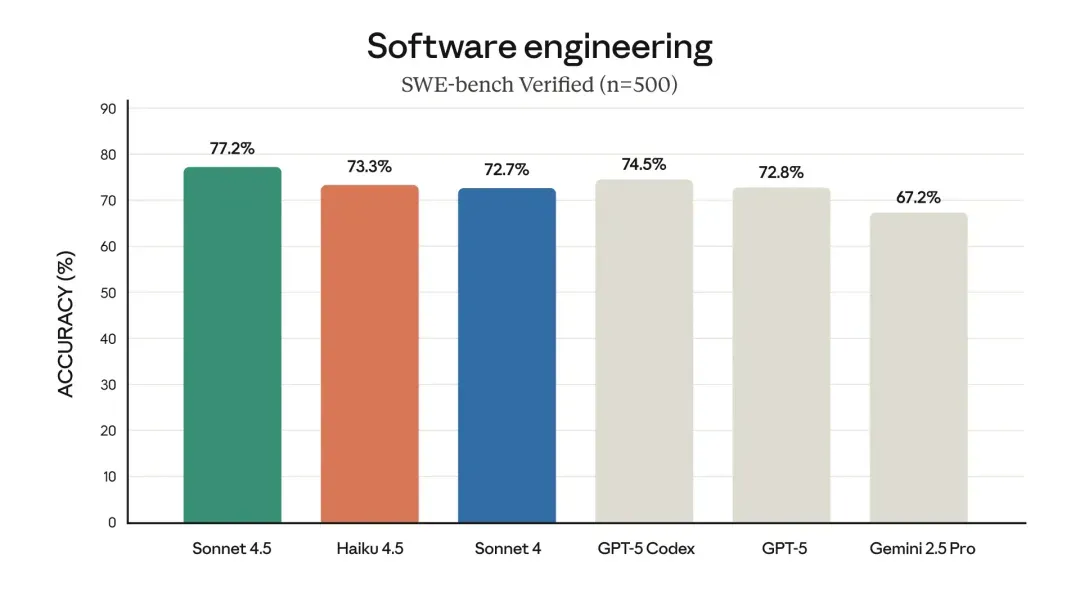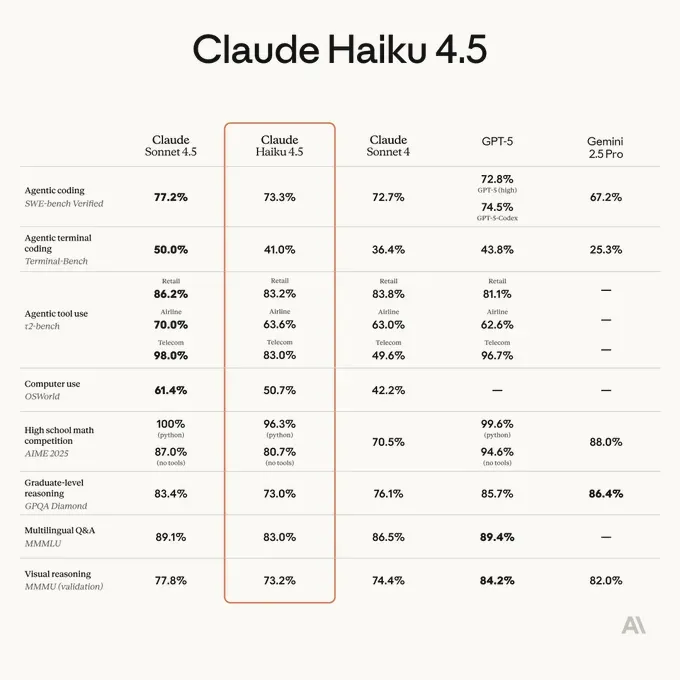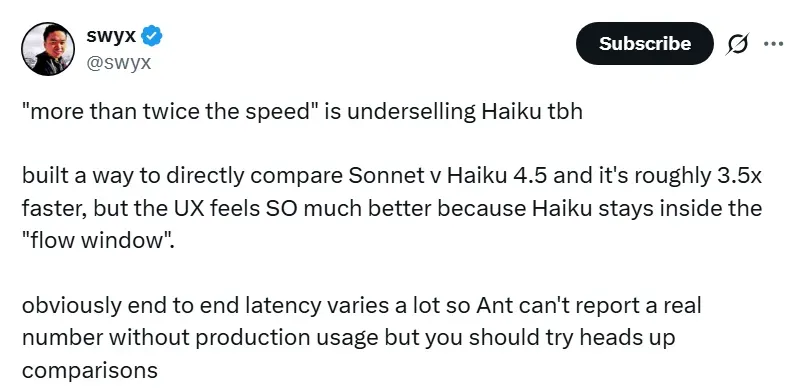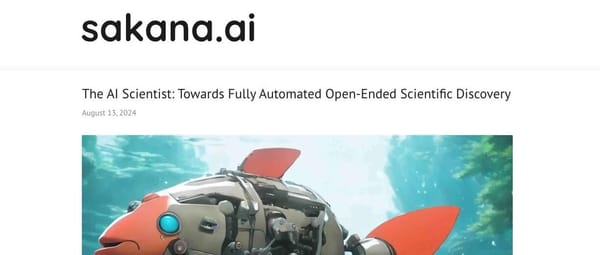Anthropic’s New Model Is Insane: Costs Down by 2/3, Performance Near GPT-5, User Tests Show It’s Even Better Than Hyped and 3.5× Faster Than Sonnet

Anthropic Launches Claude Haiku 4.5 — Faster, Cheaper, and Surprisingly Powerful
Anthropic has released Claude Haiku 4.5, its newest and smallest AI model, now available to all users.
The company claims it delivers near‑Sonnet 4 performance at one‑third the cost and more than double the speed.
Key Value Proposition
- Integrated into all free plans immediately.
- Ideal for cost‑efficient AI products — lower server load, high capability.
- Enterprise advantages: supports sub‑agents in multi‑agent systems for rapid, high‑quality handling of complex tasks.
> Anthropic spokesperson:
> “Every user can access near state‑of‑the‑art intelligence for free via Claude.ai. Sonnet handles frontier‑level planning, while Haiku supports sub‑agents to execute at speed and scale.”
---
1. Speed, Cost, and Benchmark Performance
Hybrid Reasoning Model
- Dynamically adjusts compute resources by request complexity.
- Default mode: minimal hardware usage.
- Extended thinking mode: for more complex generation.
Large Context and Output Windows
- 200,000 token multimodal prompt capacity — perfect for large documents.
- 64,000 tokens per response.
Benchmarks
- SWE‑Bench Verified: 73% — matches Sonnet 4 and GPT‑5 code generation.
- OSWorld: 50.7% — above Sonnet 4 (42.2%).
- Python Tool Math: 96.3% with tools; 80.7% without.
- Terminal Coding: 41.0% — ahead of Sonnet 4 (36.4%).


---
Safety & Alignment
- Lower incidence of risky behavior vs. Haiku 3.5.
- Misalignment rate statistically lower than Sonnet 4.5 and Opus 4.1.
- Anthropic calls Haiku 4.5 “our safest model to date.”
---
Availability & Pricing
- Live on all platforms — call `claude-haiku-4-5` via Claude API.
- Pricing: $1 per million input tokens, $5 per million output tokens.
- Comparisons:
- Sonnet 4.5: $3 / $15 — 3× more expensive
- Opus 4.1: $15 / $75 — significantly higher
> User feedback: Haiku may be ~3.5× faster than Sonnet in actual use, with smoother, consistent responses.

---
2. Unlocking New Use Cases
Rapid Release Cadence
- Haiku 4.5 follows Sonnet 4.5 (2 weeks ago) and Opus 4.1 (2 months ago).
Lightweight Yet Scalable
- Multi‑model workflows:
- Sonnet 4.5: complex planning.
- Multiple Haiku instances: parallel execution of subtasks.
Analyst Perspectives
- Lian Jye Su (Omdia): Haiku designed to complement Sonnet — boosts cost-performance ratio.
- David Nicholson (Futurum): Raises strategic questions about multi‑agent coordination and task division.
Enterprise Scenarios
- Real‑time monitoring of large datasets with Haiku.
- Hand‑off to Sonnet for in‑depth analysis.
---
3. Direct Applications in Software Development
Industry Adoption
- Claude Code: widely used in dev tools where latency matters.
- Augment: Haiku 4.5 achieves ~90% of Sonnet 4.5’s performance at far lower cost.
- Windsurf: Model "blurs" trade-offs between speed, cost, and quality.
- Gamma: Instruction-following accuracy 65% vs 44% for paid-tier model — major economic improvement.
---
4. Economic Impact — AI Costs Falling Fast
Market Context
- Anthropic monthly annualized revenue to hit $7B soon — targeting $20–26B by 2026.
- 300,000+ enterprise customers — 80% of revenue from enterprise products.
- Claude Code approaching $1B annualized revenue.
Shift in Buyer Focus
- From “AI FOMO” to measurable ROI.
- Five‑month price drop: similar performance at 2/3 lower cost since Sonnet 4.
- If trend continues, today’s leading capabilities could become cheap and commonplace in a year.
Competitive Landscape
- Anthropic valuation: $183B.
- OpenAI ~$500B — launched GPT‑5 and Sora video app.
- Analyst caution: “No single standout feature across leading vendors.”
---
5. Connecting with Open‑Source AI Monetization Platforms
Platforms like AiToEarn align perfectly with Haiku’s strengths:
- Generate, publish, monetize AI content across:
- Douyin, Kwai, WeChat, Bilibili, Rednote, Facebook, Instagram, LinkedIn, Threads, YouTube, Pinterest, X.
- Integrated analytics & model ranking: AI模型排名.
- Open source — simultaneous multi‑platform publishing for scale.
Docs & resources:
---
6. Claude Haiku 4.5 at a Glance
Feature Highlights
- Ultra‑Fast Response — ~200 ms latency for real‑time apps.
- Improved Reasoning — Better analytical depth despite small size.
- Expanded Context — Handles lengthy conversational histories.
- Broad Free Availability — API + partner network.
Ideal For:
- Customer service bots
- Content creation tools
- Educational apps
- IoT / edge devices
---
Conclusion
Claude Haiku 4.5 delivers speed, scalability, and accessibility — making high‑quality AI viable for more applications and more users, without the high cost of large models.
When combined with global publishing ecosystems like AiToEarn, it enables fast, scalable, monetizable AI workflows — a strong fit for the growing AI economy focused on cost‑performance and broad accessibility.
---
Would you like me to prepare a comparison table of Haiku 4.5 vs. other compact AI models for quick evaluation? That would make the differences even easier to digest.




